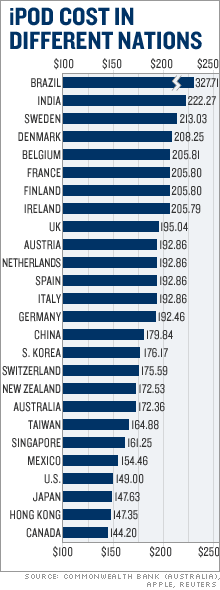
CNNMoney had a headline that the cheapest place in the world to buy an 2GB iPod Nano was in Canada.
Working from up from the bottom of the list, the next-cheapest locations for an iPod were in Hong Kong, Japan and the U.S.
The iPod is most expensive — by far — in Brazil, with India and Sweden next in line.
The writers point out that, at current exchange rates, the iPod is actually cheaper in Canada than in China, where the product is manufactured. Shipping costs seem to matter less than currency issues, with the U.S. dollar noted as undervalued.
On the other hand, The Economist recently posted its Big Mac Index. This long-running statistic had its 10th annual release in 1998, so we’re coming up to the 20-year point for that measure.
The cheapest place for a Big Mac is China, closely followed by Hong Kong, Malaysia and Egypt. The most expensive are in Iceland, Norway and Switzerland.

Of course, these types of statistics change every year. They’re layman’s versions of purchasing power parity, to give a relative idea about how much a currency is over-valued or under-valued.
If we were to think about this more seriously, though … what does it mean to have a country where iPods are cheap and food is moderately expensive — as in Canada — as compared to a country where food is cheap and iPods are moderately expensive — as in China?
It’s coming up to tax season, so maybe we’ll hear more griping, but maybe we need some more perspective on our standard of living in the first world.


